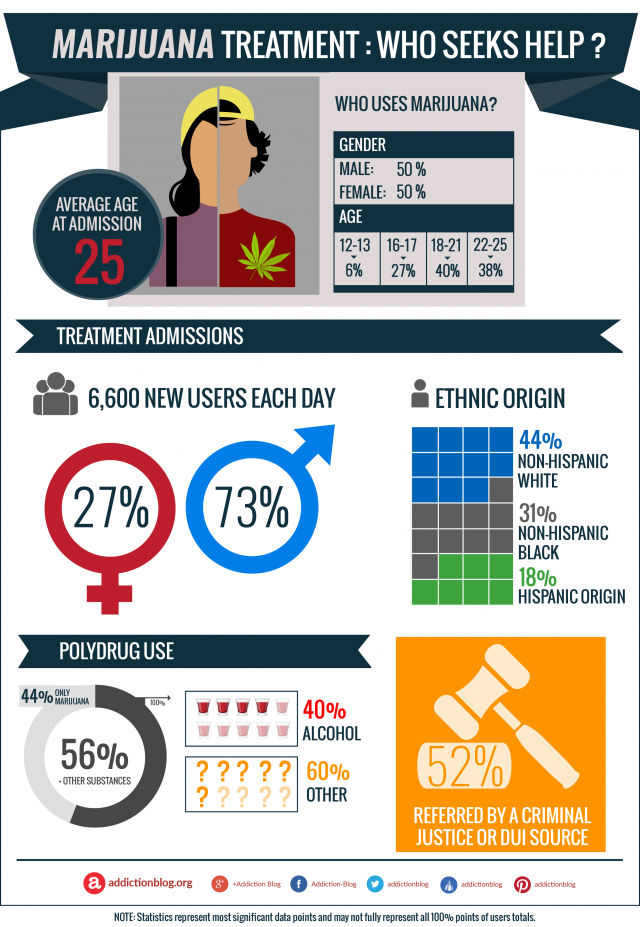Is marijuana addiction real?
Cannabis is the most commonly used illegal drug in the U.S. However, some states that have legalized medical marijuana, possession and use of a certain amount. In other states, possession and use are still illegal and punishable by federal law.
Many believe that using marijuana is harmless and not addictive, unlike some other ‘harder drugs’. But, weed can be addictive (for about 9% of users) and lead to the use of other drugs and alcohol in combination with it. Addictive use is mostly noted among early-age adopters and those who practice daily use.

Marijuana addiction treatment: Who’s seeking help?
The average age at admission to marijuana treatment was 25 years old. More males are likely to seek help (73%) compared to female users (27%), although recent studies show that the gender differential appears to be diminishing in recent years.
Out of those who seek weed addiction treatment:
- 44% are non-Hispanic White
- 31% are non-Hispanic Blacks
- 18% are of Hispanic origin
Some of evidence based treatments for marijuana addicts include cognitive-behavioral therapy and/or motivational incentives. These behavioral methods teach users how to lead a drug free life, without using marijuana to deal with everyday life stress. However, currently there are no medications available for treating marijuana addiction.
Cannabis withdrawal treatment and help
When you become physically dependent on marijuana, you can expect marijuana withdrawal symptoms to occur when you reduce usual doses or when you stop completely. Some of the most common weed withdrawal symptoms include:
- anxiety
- decreased appetite
- drug craving
- headache
- insomnia
- irritability
- restlessness
Mainly, the withdrawal symptoms from marijuana can be treated at home. However, it may be best to go through marijuana detox and withdrawal under medical supervision if you are a long-term and chronic weed user. Medical professionals are able to help you if something should go wrong during your withdrawal, and can generally make the process more comfortable.
Who needs MJ treatment? Your questions are welcomed
Would you like to ask a question or share your personal input regarding marijuana addiction treatment needs? If YES, please send us your questions via the comments section below. We appreciate your feedback and try to answer all legitimate inquiries personally and promptly.
Like this infographic? Please share and help spread good information!
Reference Sources: NDSUH: Results from the 2013 NSDUH: Summary of National Findings
DAWN: 2011: National Estimates of Drug-Related ED Visits
NIH: Drug-Related Hospital Emergency Room Visits
NIH: Marijuana Use & Educational Outcomes
NIH: Marijuana
NIH: Nationwide Trends








Related Posts